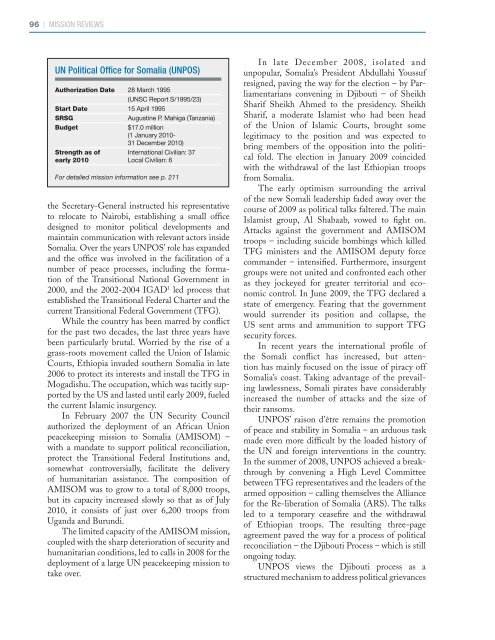here - Center on International Cooperation - New York University
here - Center on International Cooperation - New York University
here - Center on International Cooperation - New York University
Create successful ePaper yourself
Turn your PDF publications into a flip-book with our unique Google optimized e-Paper software.
96 | Missi<strong>on</strong> ReviewsUN Political Office for Somalia (UNPOS)Authorizati<strong>on</strong> Date 28 March 1995(UNSC Report S/1995/23)Start Date 15 April 1995SRSGAugustine P. Mahiga (Tanzania)Budget$17.0 milli<strong>on</strong>(1 January 2010-31 December 2010)Strength as of Internati<strong>on</strong>al Civilian: 37early 2010 Local Civilian: 6For detailed missi<strong>on</strong> informati<strong>on</strong> see p. 211the Secretary-General instructed his representativeto relocate to Nairobi, establishing a small officedesigned to m<strong>on</strong>itor political developments andmaintain communicati<strong>on</strong> with relevant actors insideSomalia. Over the years UNPOS’ role has expandedand the office was involved in the facilitati<strong>on</strong> of anumber of peace processes, including the formati<strong>on</strong>of the Transiti<strong>on</strong>al Nati<strong>on</strong>al Government in2000, and the 2002-2004 IGAD 1 led process thatestablished the Transiti<strong>on</strong>al Federal Charter and thecurrent Transiti<strong>on</strong>al Federal Government (TFG).While the country has been marred by c<strong>on</strong>flictfor the past two decades, the last three years havebeen particularly brutal. Worried by the rise of agrass-roots movement called the Uni<strong>on</strong> of IslamicCourts, Ethiopia invaded southern Somalia in late2006 to protect its interests and install the TFG inMogadishu. The occupati<strong>on</strong>, which was tacitly supportedby the US and lasted until early 2009, fueledthe current Islamic insurgency.In February 2007 the UN Security Councilauthorized the deployment of an African Uni<strong>on</strong>peacekeeping missi<strong>on</strong> to Somalia (AMISOM) –with a mandate to support political rec<strong>on</strong>ciliati<strong>on</strong>,protect the Transiti<strong>on</strong>al Federal Instituti<strong>on</strong>s and,somewhat c<strong>on</strong>troversially, facilitate the deliveryof humanitarian assistance. The compositi<strong>on</strong> ofAMISOM was to grow to a total of 8,000 troops,but its capacity increased slowly so that as of July2010, it c<strong>on</strong>sists of just over 6,200 troops fromUganda and Burundi.The limited capacity of the AMISOM missi<strong>on</strong>,coupled with the sharp deteriorati<strong>on</strong> of security andhumanitarian c<strong>on</strong>diti<strong>on</strong>s, led to calls in 2008 for thedeployment of a large UN peacekeeping missi<strong>on</strong> totake over.In late December 2008, isolated andunpopular, Somalia’s President Abdullahi Youssufresigned, paving the way for the electi<strong>on</strong> – by Parliamentariansc<strong>on</strong>vening in Djibouti – of SheikhSharif Sheikh Ahmed to the presidency. SheikhSharif, a moderate Islamist who had been headof the Uni<strong>on</strong> of Islamic Courts, brought somelegitimacy to the positi<strong>on</strong> and was expected tobring members of the oppositi<strong>on</strong> into the politicalfold. The electi<strong>on</strong> in January 2009 coincidedwith the withdrawal of the last Ethiopian troopsfrom Somalia.The early optimism surrounding the arrivalof the new Somali leadership faded away over thecourse of 2009 as political talks faltered. The mainIslamist group, Al Shabaab, vowed to fight <strong>on</strong>.Attacks against the government and AMISOMtroops – including suicide bombings which killedTFG ministers and the AMISOM deputy forcecommander – intensified. Furthermore, insurgentgroups were not united and c<strong>on</strong>fr<strong>on</strong>ted each otheras they jockeyed for greater territorial and ec<strong>on</strong>omicc<strong>on</strong>trol. In June 2009, the TFG declared astate of emergency. Fearing that the governmentwould surrender its positi<strong>on</strong> and collapse, theUS sent arms and ammuniti<strong>on</strong> to support TFGsecurity forces.In recent years the internati<strong>on</strong>al profile ofthe Somali c<strong>on</strong>flict has increased, but attenti<strong>on</strong>has mainly focused <strong>on</strong> the issue of piracy offSomalia’s coast. Taking advantage of the prevailinglawlessness, Somali pirates have c<strong>on</strong>siderablyincreased the number of attacks and the size oftheir ransoms.UNPOS’ rais<strong>on</strong> d’être remains the promoti<strong>on</strong>of peace and stability in Somalia – an arduous taskmade even more difficult by the loaded history ofthe UN and foreign interventi<strong>on</strong>s in the country.In the summer of 2008, UNPOS achieved a breakthroughby c<strong>on</strong>vening a High Level Committeebetween TFG representatives and the leaders of thearmed oppositi<strong>on</strong> – calling themselves the Alliancefor the Re-liberati<strong>on</strong> of Somalia (ARS). The talksled to a temporary ceasefire and the withdrawalof Ethiopian troops. The resulting three-pageagreement paved the way for a process of politicalrec<strong>on</strong>ciliati<strong>on</strong> – the Djibouti Process – which is still<strong>on</strong>going today.UNPOS views the Djibouti process as astructured mechanism to address political grievances
















